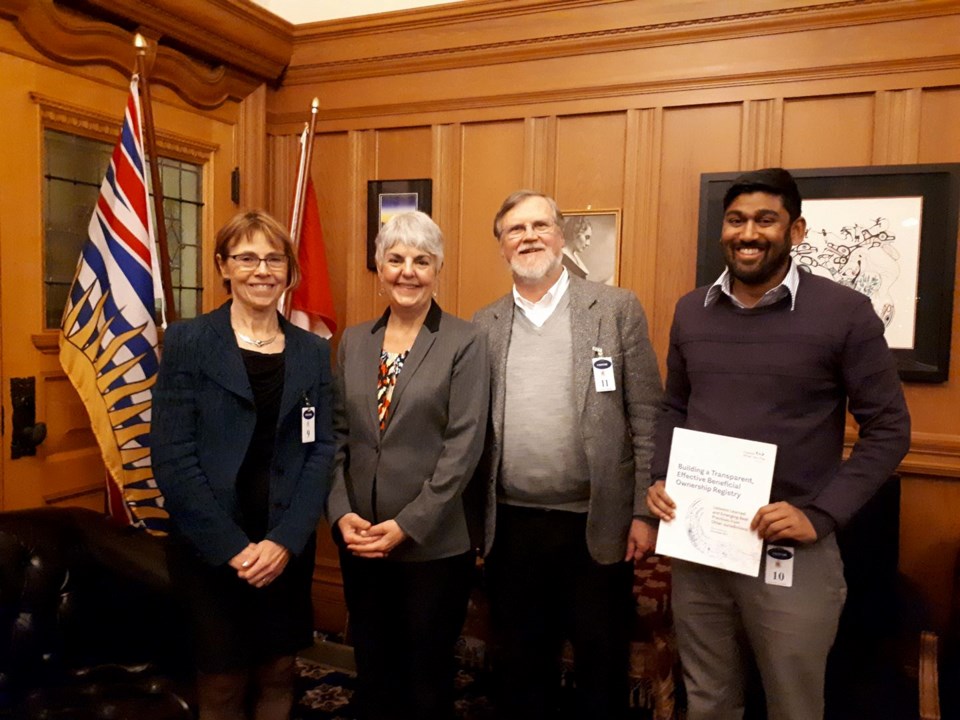It came as no surprise to former Richmond resident Sasha Caldera that the new owner of his old, childhood home in the McKay elementary catchment is a “homemaker,” who purchased the $2.6 million property with a CIBC mortgage.
“Ya, so she could be a nominee,” said Caldera, by telephone from his office in Toronto, where he works for Canadians for Tax Fairness as manager of the Beneficial Ownership Program.
“I loved that neighbourhood. But it’s starkly different to how I remember it growing up. It used to be lined with Â鶹´«Ă˝Ół»Specials and now they’re all luxury homes. It’s become less and less lively for sure. It was common to play road hockey but you see less and less of that,” said Caldera, who holds a master’s degree in international communications.
Ten years ago those old 1970s homes — sometimes called “Richmond Specials” locally — were in reach of families with middle to upper-middle class incomes. Now, new, much larger homes sell for over $3.5 million and remaining longtime residents now report the likes of empty homes,Ěýbirth tourism housesĚý˛ą˛Ô»ĺĚýillegal hotels, while student enrolment declines at McKay to the point of it being listed for closure.
While Caldera has lost the neighbourhood he grew up in, the 35-year-old Richmond born-and-raised non-profit lobbyist scored a decisive win for his cause this week when the B.C. government announced measures to shine light on his former hometown’s shady real estate sector.
Caldera is part of a coalition of non-government organizations — including Transparency International Canada and Publish What You Pay Canada — asking Canada and its provinces to create a public registry that discloses beneficial ownership of both corporations and property, thus casting light on anonymous home ownership.
Caldera contends a lack of transparency in corporate and property transactions has fuelled money laundering and tax evasion within the real estate sector, adding to the many other pressures spurring Richmond’s housing affordability crisis.
“Canada right now is the only G20 country that doesn’t have a piece of legislation that requires disclosure of beneficial owners of property. Because we’re so behind, our real estate is vulnerable to money laundering . . . this is more applicable to [Metro] Vancouver,” he said.
On Tuesday, while B.C. didn’t get a corporate registry, it did get one for property, after Finance Minister Carole James unveiled a 30-point action plan on housing. One point entails “Taking Action to End Hidden Ownership.”
“Currently in B.C., true ownership of real estate can be hidden. This means numbered companies, offshore and domestic trusts, and stand-in owners obscure the source of funds in the real estate market,” . It further states the government will require additional information about beneficial ownership on the Property Transfer Tax form. Such information will also be placed in a public registry administered by the Land Title Survey Authority.
“Having a registry means we’ll know who owns what,” notes the plan.
In the context of Richmond, the registry will help combat vulnerabilities to money laundering, said Caldera.
A beneficial owner is a person who receives the proceeds of a sale. A nominee simply appears on the property title (a "stand-in owner"). The use of nominees appears to be on the rise, notes Transparency International Canada, which,, took a snapshot of luxury homes in Â鶹´«Ă˝Ół»in 2016 showing one quarter belonged to homemakers and students.
“Nominees and beneficial owners typically enter trust agreements brokered by lawyers. A bare trust agreement, for instance, gives the beneficiary control of the property where the nominee must follow the instructions of the true owner,” said Caldera.
This hidden layer of asset management is integral to money laundering, he said.
Nominees can also be a “double whammy” for tax evasion, as beneficiaries can avoid capital gains taxes who declare homes as principal residences, which are tax exempt. has done extensive reporting on local real estate transactions that reveal such transactions.
Foreigners can also use permanent residents or citizens as nominees to avoid B.C.’s foreign buyers’ tax. A similar tactic is revealed , related to a home down the road from Caldera’s parents’ old property.
Corporations and trusts holding properties also mask beneficial ownership and can be used to avoid property transfer taxes (shares are transfered, not property titles), noted Caldera. Farm properties are known to be owned by shell companies in Richmond.
Meanwhile,Ěý has uncovered links between alleged money laundering at Richmond’s River Rock Casino and Resort, the fentanyl trade from China and real estate — dubbed the “Â鶹´«Ă˝Ół»Model” by authorities.
The registry and new disclosure rules could also help the government understand the true scope of foreign money in Richmond’s real estate sector. To date Statistics Canada notes 7.5 per cent of Richmond homes are owned outright by foreigners, although one in four new condos are being bought outside Canada.Â
“The extent and impact of foreign investment remains unknown since very little data is collected on property owners. Individuals can use shell companies, trusts and nominees to hide their beneficial interest in Canadian real estate,” notes Transparency International Canada.
Although just one piece of the puzzle, Caldera said he would hope changes to increase transparency help bring market prices more in line with the local economy, by fostering legitimate investment.
“Money laundering doesn’t benefit economies. You get a little short term investment in property but it’s out in a few years and into a secret bank account,” he said.
“The boom you see in Richmond is primarily through legitimate investment; a trend toward density and immigration. We still want to promote that but the challenge Â鶹´«Ă˝Ół»is facing is the same challenge that major centres in the world are facing.
“I want to break up the illegal party but I want keep the good stuff,” he said



